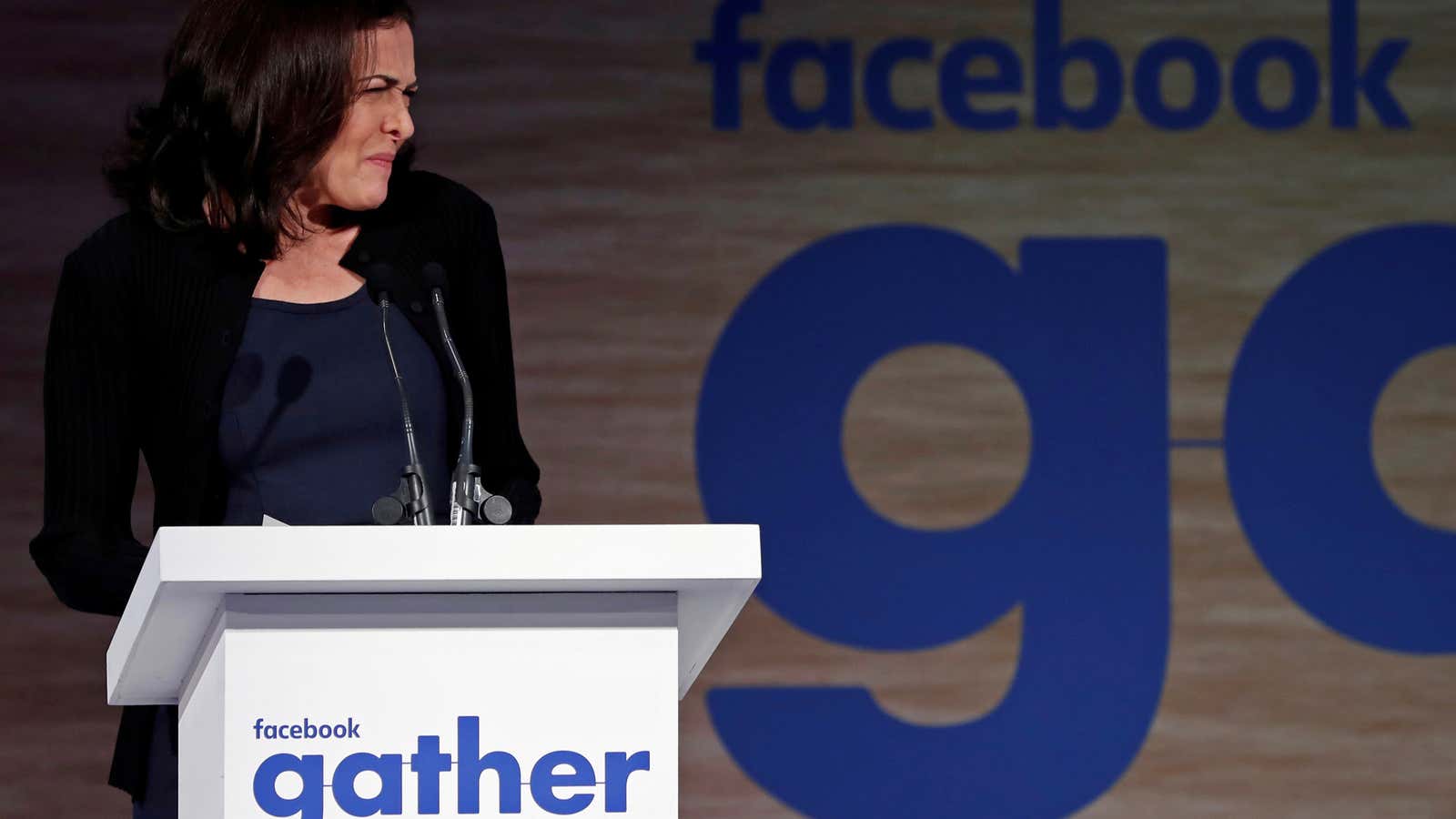In the wake of revelations in the New York Times about Facebook’s campaign to attack its perceived enemies, there has been dismay in some circles about the role played by Sheryl Sandberg. The social network’s chief operating officer, who burnished her progressive-feminist credentials with books like Lean In and commencement speeches across America, is said to have betrayed the cause by placing corporate greed before her stated principles.
Almost as quickly came the backlash to the backlash. The real betrayal of feminism was holding Sandberg up to a higher standard than her male counterparts. “Women are just as capable as men of being dishonest, dissembling, greedy, and self-interested,” wrote Jill Filopovic in Vanity Fair. ”Our demands for equality don’t stem from a claim that we’re better, more moral, or more ethical than men.”
This would be a fine and unimpeachable statement, but for the fact that many people make exactly that claim. The past decade has seen a steady procession of news articles and studies that argue women are in fact superior to men in many respects. Women are better managers, better employees, better leaders, better communicators, and better investors. Women create better workplaces. Women are better at juggling work and family. Women make better decisions under stress.
Articles arguing that companies run by women make more money and outperform the S&P 500 abound. When women are on the corporate board, their companies out-earn companies run by men.
It’s not just in business: Women are better writers, they are more emotionally intelligent, and they’re even better at singing about sex. They’re better endurance athletes and better at pacing themselves. A panel of voices assembled by the Guardian agreed the world would be a far superior place if it were run by women.
Is it any wonder, then, that we have high expectations for Sandberg and her ilk? Given the attributes assigned to them, women in leadership should be superior to their male counterparts in every way.
No matter that many of these studies rely on correlation, not causation, to draw their conclusions. Or that in many cases, the argument isn’t about adding women as much as it is about increasing diversity of viewpoints, because heterogenous groups make better decisions that homogenous ones.
Ultimately, the result of all this chatter is that we have created a new set of standards based on the same old habit of distinguishing the genders. The new approach is to simply update a sex-based classification system that has been in place since the Victorian era. Men are still from Mars; women are still from Venus—and everything is better on Venus.
Instead of gender equality, we now expect women to be superior at whatever it is they do and to not be subject to the same preoccupations, weaknesses, and temptations as men in power. We expect that by virtue of their sex, women will somehow rise in the ranks but remain immune to the heady effects of power, putting the interests of the group or of society at large above corporate concerns or personal survival.
Perhaps it’s a natural response to patriarchy to be unsatisfied with mere equality. After centuries of being forced to accept less, women are rightly ready for more. Domination has led us to view domination as desirable, and for many, “Grrrl power” means women shouldn’t just take their fair share of seats at the table, but should take them all, because they’d do a better job. An equal and opposite mythology about female superiority seems, at least superficially, like a healthy antidote to past approaches.
However, the new doctrine of female triumphalism is a dangerous trap. Instead of liberating women, this new paradigm binds ladies yet again. It reinforces old stories about how women are in touch with their emotions, are cooperative rather than competitive, and are especially sensitive to the needs of others. We have, by touting alleged female superiority, used old shackles to create a new set of constricting expectations about how women should behave and where their strengths lie. This new version of feminine power is still tied to dated notions of the fairer sex as nurturing, gentle, and group-oriented, notions that we don’t know to be actually natural or biological but may just be a product of cultural conditioning.
If we hope to ever change our conditioning on a grand scale, we need the stories of Sandberg as a sharp operator at least as much as we needed her messaging about leaning in. We need female anti-heroes like Elizabeth Holmes, who showed that being a cutthroat egomaniac with a business drive so powerful it leads to crime is entirely possible for women. We even need world-renowned empathy researchers who are bullies, like Tania Singer, and female professors who harass male students, like Avital Ronell at NYU, to dispel myths of the gentle feminine leader. Only then is the full complexity of humanity evident, and that’s a first step to really achieving gender equality.
If the goal of feminism is equality—and not just a new, more superficially flattering mythology that ends up wrapping women in ever-fancier ribbons—we have to see the good, the bad, and the ugly in all of us. Real feminists don’t expect all women to be exceptional. Instead, we must expect complexity from everyone, and ignore claims of superiority from anyone, whatever gender.
